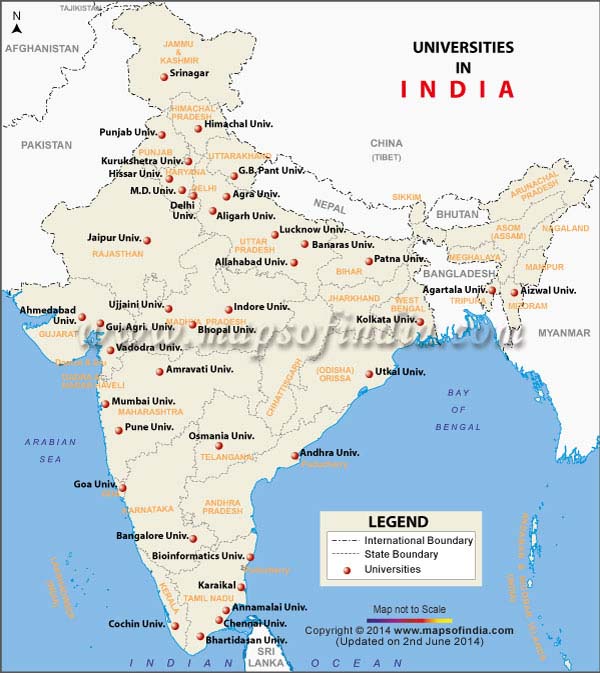
| *The Map showing the Top Most Universities in India. |
| Disclaimer: All efforts have been made to make this image accurate. However Mapping Digiworld Pvt Ltd and its directors do not own any responsibility for the correctness or authenticity of the same. |
India has both public and private universities. Public universities are supported by the Indian government and the state governments. Private universities are run by different organisations, groups and societies. In India, universities are recognised by the University Grants Commission (UGC), under the control of the University Grants Commission Act, 1956. Fifteen additional professional councils are also established that help control the different facets of accreditation and coordination. Besides the different type of universities, there are also some institutes in the country that are considered as the "institutes of national importance". There are four types of universities in India - Central Universities, State Universities, Deemed Universities and Private Universities.
Central universities are those universities that are set up by an act of the Parliament. The funding for maintenance and development of these universities is provided by the University Grants Commission. There are 45 central universities in India, out of which 40 come under the purview of the Ministry of Human Resource Development. The Indira Gandhi National Open University and the Central Agricultural University, Imphal do not get funding from the UGC. Instead, they get assistance from the Ministry of Human Resource Development and the Ministry of Agriculture respectively. Some of the central universities are Allahabad University, the University of Delhi and Banaras Hindu University (BHU).
State universities are those universities that are recognised by an act of the Parliament and set up by the same. Currently, there are 318 state universities in India, including the oldest universities of the country; namely, the University of Madras, the University of Calcutta and the University of Mumbai. According to Section 12 (B) of the UGC Act, the state universities that were formed after 17 June 1972 are not eligible to receive any grant/fund from the UGC, the central government or any organisation that already receives grants from the government. The establishment of state universities and provisions for grant of funds are made by the state governments.
Private universities are those universities that are neither governed nor operated by government. They are established through a central or state act by any sponsoring body like any society registered under the Societies Registration Act 1860 or any other law that for a time being is in force in any state or public trust or a company that is registered under Section 25 of the Companies Act, 1956. Private universities must be recognised by the UGC so that the degrees awarded by these universities to the students hold some value and importance.
There are some institutes offering higher education that are not universities but are mostly recognised for their high quality education. These institutes are given the status of a university. Such institutions are called deemed university or deemed-to-be-university. The UGC grants the status of university. These institutes with the status of deemed university enjoy full autonomy to set up their course work and syllabus as well as guidelines regarding admissions, fees and other instructions. Symbiosis Institute of Business Management, National Institute of Technology and Narsee Monjee Institute of Management are some of the deemed universities in India.